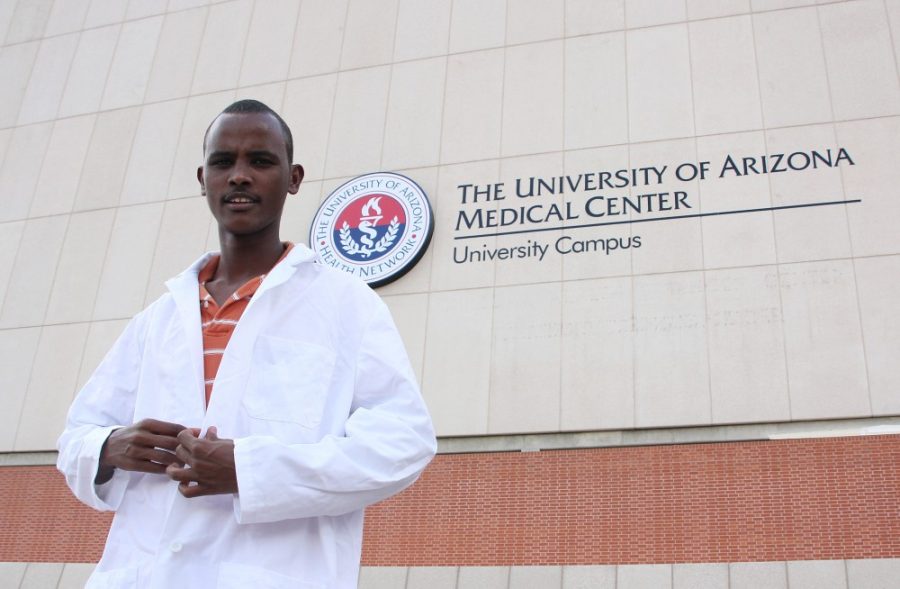Men with both arms sawed off, mothers lying dead on the ground after giving birth and children with rib cages that appeared ready to pop out of their skin are all patients in one of Kenya’s Dadaab refugee camps.
Hussein Magale, who fled Somalia with his family in 1992 because of the country’s civil war, lived in the city’s camp for most of his life. The biochemistry sophomore, who speaks three languages, began translating for Doctors Without Borders, a humanitarian organization helping his camp, when he was a teenager.
“No religion, color, race, nothing. They (doctors) only see humans,” Magale said.
The camp was an open prison. It was small, smelled like trash and crammed with people. Magale said the Kenyan government was abusive and prevented the refugees from looking for jobs or leaving the camp.
“Where can you go? If you’re not Kenyan, you can’t live,” he said. “Not like a human.”
The police and their wooden canes were the cruelest, Magale said.
Magale said he always excelled in class and valued education because it was the only way out of the camp. Many kids couldn’t handle the abuse and would commit suicide, he said.
School was difficult, especially because of a shortage of materials. Pencils were broken so more students could use them and there was only one book for every 20 students, Magale said.
Students would fight for the books before it was their turn to use them, especially around test times. Refugees received the same difficult curriculum as Kenyan students living outside of the camp, who had more resources to work with, Magale said.
“And their teachers don’t cane them,” he added.
Outside of academics, Magale said he would spend a lot of time thinking about food. It was unheard of for a refugee to eat three meals a day and families would have to ration their food and decide what time of day they wanted to go hungry, he said.
Magale said he would drink a lot of water at night just to feel something in his stomach. The bathroom trips from drinking all the water made trying to sleep even worse.
To receive the Kenyan Certificate of Primary Education, or KCPE, Magale said he had to place in the top 100 out of more than 600 students in his group taking the high school entrance exam. If he failed, he said he’d have to wait two years retake it. He was number 23.
Magale said he continued to excel in high school until he arrived in Tucson in November 2009 through a United Nations resettlement program.
Nura Dualeh, assistant director for the McNair Achievement Program, met Magale through volunteering with Project Reach. The Tucson Unified School District program (Project Reach) helps refugee students graduate from high school and transition to higher education or sustainable employment.
Dualeh said the agency that brought him here did not enroll him in school right away. So Magale took the initiative, called around and filled out the paperwork. A few months after he left Kenya’s refugee camps, he was already taking classes at Catalina High School.
He took 10 courses, including advanced placement classes, in his first and only semester of high school in the U.S. He made the honor roll and graduated with a GPA above 3.5.
“There was a kid in the camp who didn’t have arms, he used to write with his feet,” he said. “He hoped someone would save him from the camps. No arms but he still had dreams. I know how blessed I am to be in the states getting my education and I always do my best in class. And I never forget where I come from. Never.”
He took summer school at the UA as an Arizona Assurance Scholar. The program provides academic, financial and social assistance to low-income Arizona residents.
Jon LaGuardia, who taught Magale’s English 102 class in his first fall semester, said Magale gave a speech to the class about living in Kenya. LaGuardia said class time almost ran out because of how many questions his peers asked him.
“He has a voice that needs to be heard,” LaGuardia said. “There are things the world needs to know that Hussein wants to deliver to it.”
Magale’s GPA is still well above a 3.5, he’s part of the Arizona Assurance Scholars Club, captain of a soccer team and translates for University of Arizona Medical Center-University Campus doctors through Arizona Language and Transportation Services LLC, a non-medical emergency transportation and language services provider.
Magale said he hopes that as more people find out about what’s going in the Kenyan refugee camps, they decide to take an active role in helping the victims.
“Hundreds of thousands of people have my story and they’re still waiting for help,” he said. “They need someone to care and listen.”









